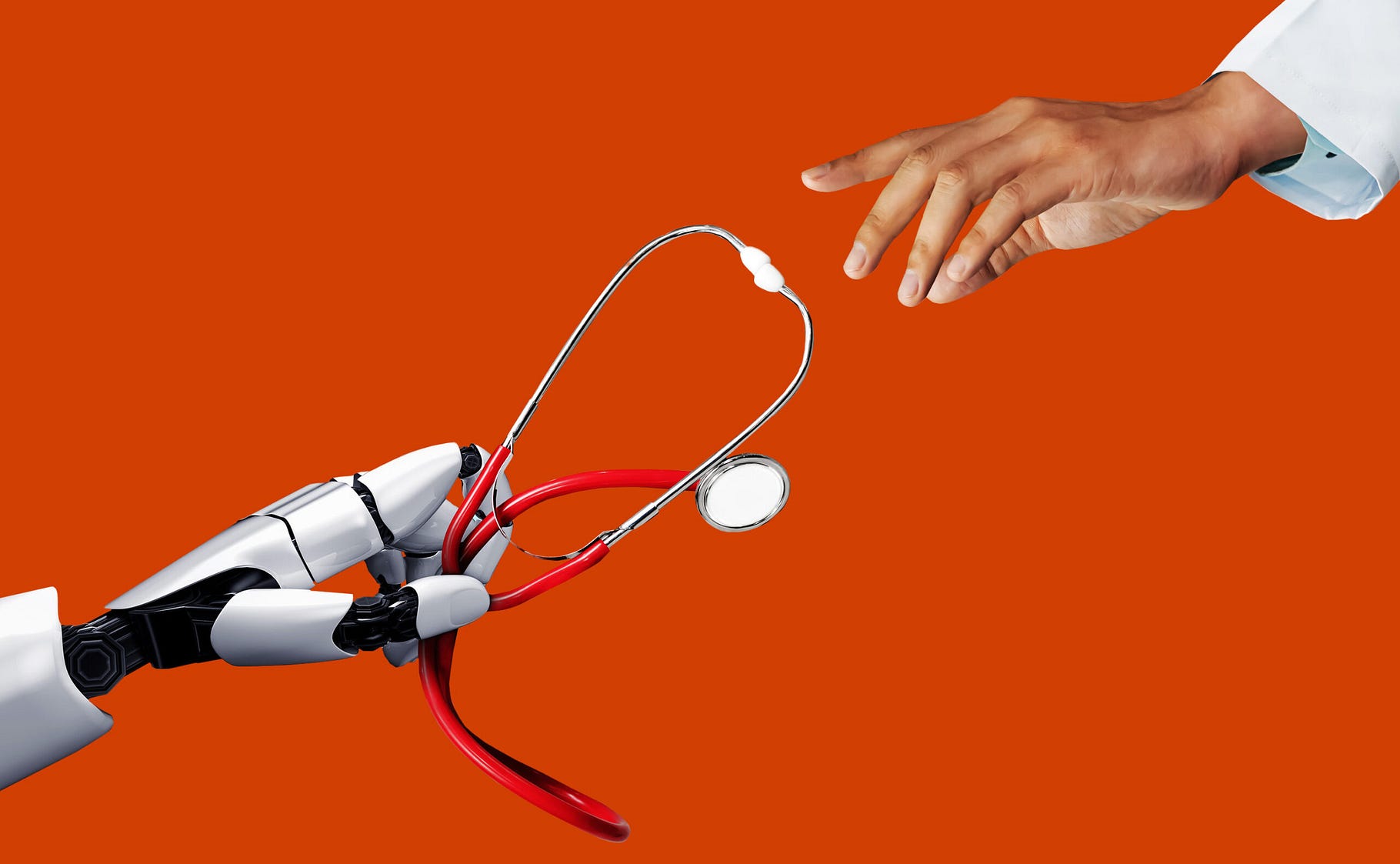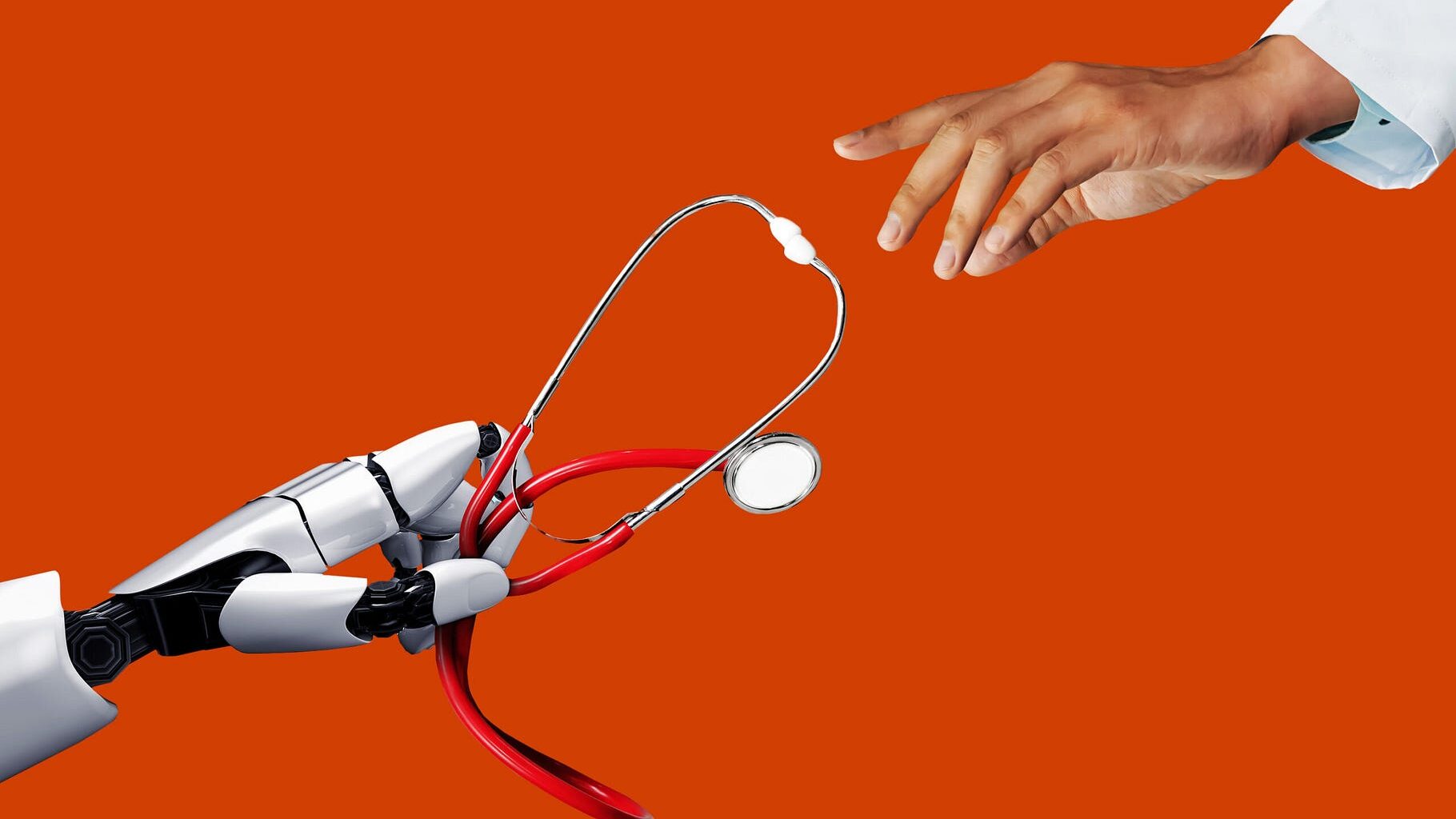The Health Strategist
institute for
continuous health transformation
and digital health
Joaquim Cardoso MSc
Chief Research and Strategy Officer (CRSO)
May 12, 2023
ONE PAGE SUMMARY
Artificial intelligence (A.I.) has the potential to revolutionize healthcare by transforming how we diagnose and treat diseases.
- 1.A.I. systems are being developed to analyze vast amounts of data from patients’ health records, genetics, and symptoms, allowing for more accurate predictions and personalized treatment plans.
- 2.Additionally, A.I. can assist in pathology by recognizing disease indicators that even trained professionals might miss.
- While A.I. shows promise in improving healthcare outcomes, it is best used in conjunction with doctors rather than replacing them entirely.
The integration of A.I. in healthcare can enhance the patient-doctor relationship by augmenting diagnostic capabilities and improving accuracy.
- A.I.-enabled tools, such as the Mayo Clinic’s screening tool for heart problems, have shown high accuracy rates, outperforming traditional methods.
However, A.I. lacks the adaptability and human qualities of caring and compassion that are essential in patient care.
- Studies indicate that combining A.I. with human expertise yields better diagnostic results compared to A.I. alone.
Public opinion regarding A.I.-driven healthcare remains mixed, with some concerns about relying on A.I. for diagnoses and treatment recommendations.
- A.I.’s limitations, such as its narrow knowledge base and occasional failures, have raised skepticism.
- However, experts believe that as the technology continues to improve and demonstrate its potential for life-saving efficiencies, attitudes toward A.I. in healthcare will likely change.
To address concerns and ensure responsible use, A.I. engines need to be properly trained and educated with relevant and accurate information.
- Precautions should be taken to avoid overreliance on broad internet-based training, which can introduce misinformation.
- When used responsibly, A.I. has the potential to provide highly individualized care and significantly reduce chronic conditions like diabetes and arthritis.
While understandable concerns persist, the advancements and promising capabilities of A.I. offer newfound hope in addressing chronic diseases at their roots and potentially eradicating them.
- The integration of A.I. with human expertise can transform medicine, providing more precise diagnoses, personalized treatments, and preventive care strategies.
In conclusion, A.I. is poised to significantly impact healthcare but is unlikely to replace doctors entirely. A.I. should be seen as a complementary tool that enhances medical practice, allowing for more efficient and accurate diagnosis and treatment.
- The responsible integration of A.I. in healthcare has the potential to revolutionize patient care, improve outcomes, and ultimately lead to the eradication of chronic diseases.
DEEP DIVE

Could A.I. Replace Your Doctor?
Katie Couric
By Tess Bonn
May 10, 2023
The patient experience could change dramatically.
From real estate to e-commerce, artificial intelligence is rapidly expanding across many industries, and healthcare is certainly no exception. Even though the technology still has a lot of room to grow, it has vastly advanced over the last several decades, from the Furby toys that were popular in the early 2000s to the facial recognition features we see on our smartphones today — and some even believe it’s already poised to transform medicine as we know it.
So what would this futuristic scenario look like, exactly?
Well, picture yourself in the year 2080 — you go to your local clinic because you’re not feeling well, and an Alexa-like device asks you to share your symptoms. In response, this computer system jots down your personal information, pulls data from your past records, and suggests various test options. After picking one and providing your results, the program then prescribes you some medication to help treat your condition.
“These large language models make it possible to have back-and-forth conversations related to symptoms and daily behaviors,” says longevity researcher Nathan Price, Ph.D., who’s a chief scientific officer of wellness company Thorne HealthTech. “They can build out an assessment of what’s happening in a person’s life in a much deeper way than doctor’s could do before.”
While this may seem like the stuff of science fiction, the reality is that A.I. systems are already being developed to help diagnose various conditions, ranging from heart disease to cancer. Here’s a look at how technology could change healthcare and whether or not it will eventually replace your doctor.

How can A.I. improve healthcare?
Proponents of this new technology believe that A.I. could help in two main ways.
- The first area where it could make inroads is with data mining:
Experts say future software could analyze massive amounts of information and extract patterns from past patients’ health records, including their genetics and symptoms. Based on similarities, the system could predict the most effective treatment plan for new patients.
“The ability to deliver thousands of those actionable possibilities to physicians and to do it in a way that’s relevant for each individual is going to be key,” says renowned scientist Lee Hood, Ph.D., who cowrote The Age of Scientific Wellness? with Price.
- The second area is in diagnosis, particularly when it comes to pathology or the study of various diseases.
For example, a computer could be given a set of scans from someone carrying a disease, and the software program could then be trained using those images to recognize features that indicate a positive or negative result for that illness. Hood adds that they also might be able to detect signs of disease that even a trained eye might not spot.
“A.I. has given us an enormous ability to look at pathology slides and interpret them both rapidly and extremely accurately,” says Hood. “I think in a similar vein, A.I. is going to be able to look at the images of your brain, and as the repertoire of images accumulates in its correlation with the phenotype of each individual, they’ll get more and more accurate in being able to flag very subtle things.”
In addition to picking up on things doctors miss, the tech could also make diagnostics more accurate, including for those with heart problems.
The Mayo Clinic’s A.I.-enabled screening tool can be applied to Apple Watch ECG recordings and has been shown to detect left ventricular dysfunction 93 percent of the time.
By comparison, a mammogram is accurate 85 percent of the time.

What does A.I. mean for patient-doctor relationships?
Even if evidence shows that A.I. performs just as well — if not better — than doctors in some scenarios, will robots completely eventually replace physicians? Well, not exactly.
Price thinks A.I. works best when used in tandem with doctors. A.I. can indeed perform some tasks well beyond the skill of any human, such as generating text on any topic quickly or assessing huge numbers of variables, but it also isn’t nearly as adaptable as humans.
“An A.I. only knows what it is trained on, so when a large language model like ChatGPT is generating text, that is all that it is doing,” Price tells us. “It doesn’t have any idea of who a patient is, what medicine is, why we would care, or any understanding of physical reality, so A.I. will only answer a question with the knowledge and tools it has been given.”
There are even studies that back up Price’s theory. For example, a 2020 study published in the European Journal of Radiology found that two radiologists who incorporated an A.I. program’s output into their evaluations performed better diagnostic tests than the software on its own.
Machine systems also lack a fundamental human quality: “Caring and compassion are critical elements in what patients receive from caregivers, and clearly this will not be replaced by A.I.,” says Price.
That said, he also pointed to a study published in JAMA Internal Medicine that found that patients actually preferred chatbot responses over ones that were written by physicians and rated them significantly higher for both quality and empathy.

How do Americans feel about A.I.-driven healthcare?
There’s a lot of lingering discomfort with the idea of A.I. being used in medicine.
According to a February poll from the Pew Research Center, 60 percent of people would be uncomfortable if their healthcare provider relied on A.I. to diagnose or recommend treatment options, compared to 39 percent who said they have no issue with it.
But these fears are valid: Price says A.I.’s limited ability to only answer questions with the knowledge and tools it has been given has led to some major failures early on. For instance, the system once predicted that doctors could massively reduce deaths from cardiovascular disease by having people ingest carcinogens, or known cancer-causing substances.
It is true that killing people one way means fewer of them will die another way, which technically makes the A.I.’s suggestion “a correct answer to the query,” Price says. But he adds an essential caveat: “No human would make such a mistake because of adaptability, and a better understanding of much more about the world.”
Still, both Price and Hood remain optimistic that the public’s attitude towards the use of A.I. in healthcare will change, pointing to the technology’s potentially life-saving efficiencies. That said, they also agree that general fears around A.I. capabilities are valid — both experts warn that some engines have been “too broadly educated.” In other words, these systems have been given free rein on the internet, and they take in all of the data, including inaccurate or irrelevant information. “For medicine, it’s important to educate the A.I. engine in a way that’s relevant to the information that you have and that you want to decipher,” Hood told us.
But when used responsibly, experts ultimately believe A.I.’s ability to prove highly individualized care could change the game when it comes to not only treating diseases but also preventing them in the first place.
Hood estimates that these systems could reduce chronic conditions like diabetes and arthritis by as much as 50 percent.
So while concerns around A.I. are certainly justifiable, their promising advances offer some hope not previously thought possible.
“For the first time in human history, A.I. has given us the tools that it might take to seriously deal with all these chronic diseases in a way that we can get at their roots and potentially eradicate them,” says Price.
Originally published at https://katiecouric.com on May 10, 2023.
Names mentioned
- Nathan Price, Ph.D. (chief scientific officer of wellness company Thorne HealthTech and longevity researcher)
- Lee Hood, Ph.D. (renowned scientist and co-author of “The Age of Scientific Wellness?”)












